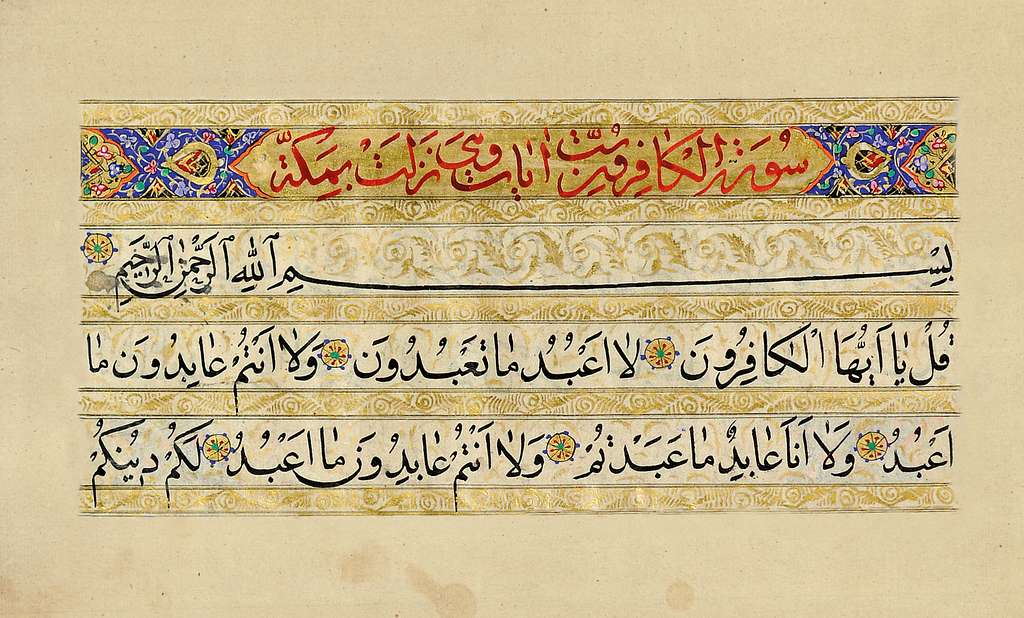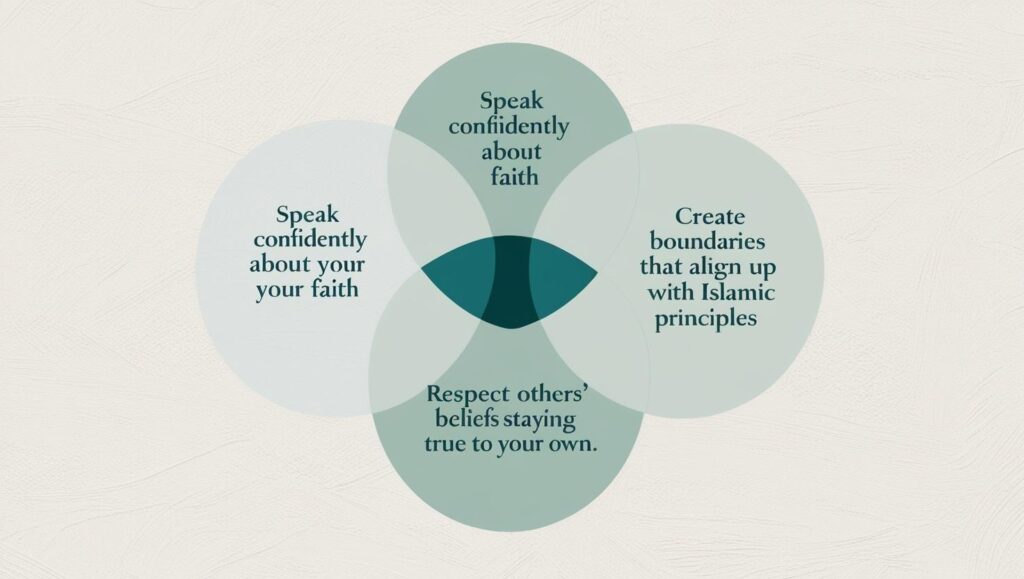Sana Maryam Idrees, UK

Allah the Almighty states in the Holy Quran in Surah al-Kafirun:
“Say, ‘O ye disbelievers! I worship not that which you worship; nor worship you what I worship. And I am not [going] to worship that which you worship; nor will you worship what I worship. For you your religion, and for me my religion.’” (Surah al-Kafirun, Ch.109: V.1-6)
Surah al-Kafirun is a Meccan chapter that was revealed before the Hijrah. It holds a pivotal place in the Quran due to its emphatic rejection of polytheism and unwavering commitment to monotheism. The chapter’s revelation serves as a definitive response to the pagans of Mecca who sought a compromise in worship between Islam and idolatry.
The uncompromising tone of this Surah negates the possibility of Muslims conforming to the disbelievers’ ways, regardless of pressure or enticement. This clear stance highlights the central tenet of Islam: the oneness of Allah.
Linguistic insights
- قُلْ (“Say”): This command addresses not only the Prophet Muhammadsa but also every believer, urging them to boldly proclaim their faith. The repetition of “say” throughout the Quran underscores the importance of the subject it introduces.
- الكَافِرُونِ (“the disbelievers”): This term refers to those who consciously reject faith after recognising its truth. It encompasses all forms of disbelief, whether active or passive.
- Repetition of negation (“I do not worship” and “you do not worship”): The verses are structured to emphasise a complete and eternal rejection of idolatry – past, present, and future – highlighting the incompatibility of belief and disbelief.
- لَكُمْ دِيْنُكُمْ وَلِيِ دِيْنِ (“For you is your religion, and for me is my religion”): The word دِيْن (deen) encompasses religion, lifestyle, and system of belief. This verse sets a boundary, affirming mutual independence in matters of faith.
Thematic and spiritual insights
In an era where moral norms are increasingly ambiguous, these principles are vital. Empirical research supports the psychological and social benefits of such clarity and boundary-setting.
A study published in Frontiers in Psychology found that personal values significantly influence life satisfaction, with resilience and emotional intelligence acting as mediators. This suggests that individuals with clear personal values, bolstered by resilience and emotional intelligence, experience higher life satisfaction.
A Muslim’s identity revolves around the recognition of one’s relationship with Allah as the Creator and Sustainer. It is deeply rooted in the principles of Tawhid (Oneness of Allah), adherence to the Quran and Sunnah, and embodies Islamic values such as justice, humility, compassion, and integrity. These values serve as guiding principles for Muslims, shaping their spiritual, ethical, and social lives.
Personal boundaries
However, maintaining a Muslim identity in Western societies can often be challenging, as many Islamic practices and values differ from what is considered “normal” or mainstream. For instance, avoiding after-work mixed gatherings, refraining from mingling freely with the opposite sex, declining invitations to parties where alcohol and drugs are present, or adhering to modest dress codes are conscious choices rooted in faith. Yet, these practices may sometimes be misunderstood or viewed as unconventional in environments where such behaviour is the norm.
These challenges require Muslims to navigate their faith with resilience and conviction, often balancing their values with societal expectations. Upholding these aspects of Muslim identity in such contexts can be a profound expression of dedication to one’s beliefs and principles.
Research looking at the relationship between self-esteem, self-compassion, and psychological resilience suggests that a positive attitude towards oneself, which can be fostered by clear personal values and boundaries, serves psychological resilience and plays a role in preserving mental health and well-being.
Clear communication
So for Muslims, openly communicating their values – such as refraining from alcohol, attending prayers, or observing modesty – helps establish clear expectations with peers and reduces internal conflict over societal pressures. This clarity can mitigate stress and reinforce a sense of self-worth.
Initially, asserting personal boundaries and communicating one’s identity may feel difficult or socially isolating. For example, explaining why one avoids after-work gatherings or refuses certain social norms might create discomfort initially.
However, over time, consistent and respectful communication fosters mutual understanding and respect, potentially reducing future misunderstandings or conflicts. The Surah does not instigate hostility but establishes a dignified separation between believers and disbelievers in matters of faith. Clear communication, respectful disagreement, and the recognition of individual autonomy are essential for fostering understanding and coexistence in a diverse world.
The verse “For you your religion, and for me my religion” quoted earlier provides a profound foundation for non-hostile debate, emphasising mutual respect and the freedom to hold differing beliefs. Scientific reasoning further supports this approach as essential for productive dialogue and social harmony.
Then, clear communication ensures that the intent behind words is not misinterpreted. Studies in communication psychology suggest that ambiguity in messaging can lead to unnecessary conflict and emotional distress (Fischer & Orasanu, 1999).
Research shows that respectful discourse, even amidst disagreement, fosters cooperation and strengthens interpersonal relationships. This aligns with the Quranic emphasis on dignified dialogue. Lastly, the Quranic approach of “For you your religion, and for me my religion” also respects the autonomy of free speech, encouraging coexistence rather than coercion.
Final thoughts
The reader can further reflect on this Surah and ask: How can the unwavering stance of Surah al-Kafirun inspire us in moments when our faith is challenged? What lessons can we draw from the Quran’s approach to disagreement and coexistence? How does this Surah encourage self-confidence and clarity in personal identity?
Actionable wisdom can be derived from this Surah, helping us practice courage in openly affirming our beliefs without hostility or compromise. We can reflect on our boundaries in matters of faith and values, ensuring they align with Islamic principles, and engage with individuals of different beliefs respectfully, drawing inspiration from the Quran’s guidance on coexistence.


